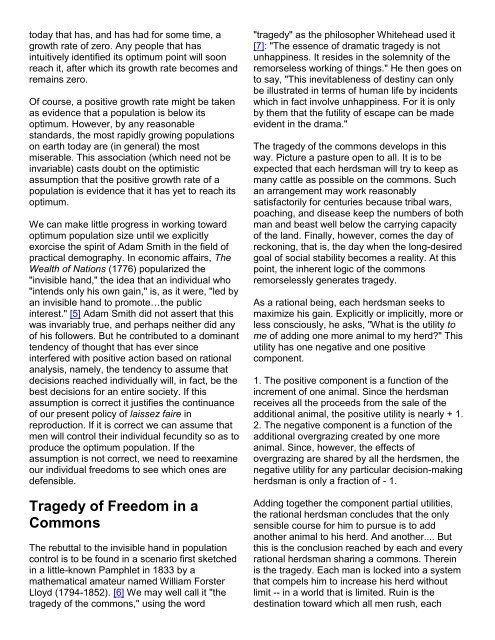The Tragedy of the Commons What Shall We Maximize?
The Tragedy of the Commons What Shall We Maximize?
The Tragedy of the Commons What Shall We Maximize?
Create successful ePaper yourself
Turn your PDF publications into a flip-book with our unique Google optimized e-Paper software.
today that has, and has had for some time, agrowth rate <strong>of</strong> zero. Any people that hasintuitively identified its optimum point will soonreach it, after which its growth rate becomes andremains zero.Of course, a positive growth rate might be takenas evidence that a population is below itsoptimum. However, by any reasonablestandards, <strong>the</strong> most rapidly growing populationson earth today are (in general) <strong>the</strong> mostmiserable. This association (which need not beinvariable) casts doubt on <strong>the</strong> optimisticassumption that <strong>the</strong> positive growth rate <strong>of</strong> apopulation is evidence that it has yet to reach itsoptimum.<strong>We</strong> can make little progress in working towardoptimum population size until we explicitlyexorcise <strong>the</strong> spirit <strong>of</strong> Adam Smith in <strong>the</strong> field <strong>of</strong>practical demography. In economic affairs, <strong>The</strong><strong>We</strong>alth <strong>of</strong> Nations (1776) popularized <strong>the</strong>"invisible hand," <strong>the</strong> idea that an individual who"intends only his own gain," is, as it were, "led byan invisible hand to promote…<strong>the</strong> publicinterest." [5] Adam Smith did not assert that thiswas invariably true, and perhaps nei<strong>the</strong>r did any<strong>of</strong> his followers. But he contributed to a dominanttendency <strong>of</strong> thought that has ever sinceinterfered with positive action based on rationalanalysis, namely, <strong>the</strong> tendency to assume thatdecisions reached individually will, in fact, be <strong>the</strong>best decisions for an entire society. If thisassumption is correct it justifies <strong>the</strong> continuance<strong>of</strong> our present policy <strong>of</strong> laissez faire inreproduction. If it is correct we can assume thatmen will control <strong>the</strong>ir individual fecundity so as toproduce <strong>the</strong> optimum population. If <strong>the</strong>assumption is not correct, we need to reexamineour individual freedoms to see which ones aredefensible.<strong>Tragedy</strong> <strong>of</strong> Freedom in a<strong>Commons</strong><strong>The</strong> rebuttal to <strong>the</strong> invisible hand in populationcontrol is to be found in a scenario first sketchedin a little-known Pamphlet in 1833 by ama<strong>the</strong>matical amateur named William ForsterLloyd (1794-1852). [6] <strong>We</strong> may well call it "<strong>the</strong>tragedy <strong>of</strong> <strong>the</strong> commons," using <strong>the</strong> word"tragedy" as <strong>the</strong> philosopher Whitehead used it[7]: "<strong>The</strong> essence <strong>of</strong> dramatic tragedy is notunhappiness. It resides in <strong>the</strong> solemnity <strong>of</strong> <strong>the</strong>remorseless working <strong>of</strong> things." He <strong>the</strong>n goes onto say, "This inevitableness <strong>of</strong> destiny can onlybe illustrated in terms <strong>of</strong> human life by incidentswhich in fact involve unhappiness. For it is onlyby <strong>the</strong>m that <strong>the</strong> futility <strong>of</strong> escape can be madeevident in <strong>the</strong> drama."<strong>The</strong> tragedy <strong>of</strong> <strong>the</strong> commons develops in thisway. Picture a pasture open to all. It is to beexpected that each herdsman will try to keep asmany cattle as possible on <strong>the</strong> commons. Suchan arrangement may work reasonablysatisfactorily for centuries because tribal wars,poaching, and disease keep <strong>the</strong> numbers <strong>of</strong> bothman and beast well below <strong>the</strong> carrying capacity<strong>of</strong> <strong>the</strong> land. Finally, however, comes <strong>the</strong> day <strong>of</strong>reckoning, that is, <strong>the</strong> day when <strong>the</strong> long-desiredgoal <strong>of</strong> social stability becomes a reality. At thispoint, <strong>the</strong> inherent logic <strong>of</strong> <strong>the</strong> commonsremorselessly generates tragedy.As a rational being, each herdsman seeks tomaximize his gain. Explicitly or implicitly, more orless consciously, he asks, "<strong>What</strong> is <strong>the</strong> utility tome <strong>of</strong> adding one more animal to my herd?" Thisutility has one negative and one positivecomponent.1. <strong>The</strong> positive component is a function <strong>of</strong> <strong>the</strong>increment <strong>of</strong> one animal. Since <strong>the</strong> herdsmanreceives all <strong>the</strong> proceeds from <strong>the</strong> sale <strong>of</strong> <strong>the</strong>additional animal, <strong>the</strong> positive utility is nearly + 1.2. <strong>The</strong> negative component is a function <strong>of</strong> <strong>the</strong>additional overgrazing created by one moreanimal. Since, however, <strong>the</strong> effects <strong>of</strong>overgrazing are shared by all <strong>the</strong> herdsmen, <strong>the</strong>negative utility for any particular decision-makingherdsman is only a fraction <strong>of</strong> - 1.Adding toge<strong>the</strong>r <strong>the</strong> component partial utilities,<strong>the</strong> rational herdsman concludes that <strong>the</strong> onlysensible course for him to pursue is to addano<strong>the</strong>r animal to his herd. And ano<strong>the</strong>r.... Butthis is <strong>the</strong> conclusion reached by each and everyrational herdsman sharing a commons. <strong>The</strong>reinis <strong>the</strong> tragedy. Each man is locked into a systemthat compels him to increase his herd withoutlimit -- in a world that is limited. Ruin is <strong>the</strong>destination toward which all men rush, each






